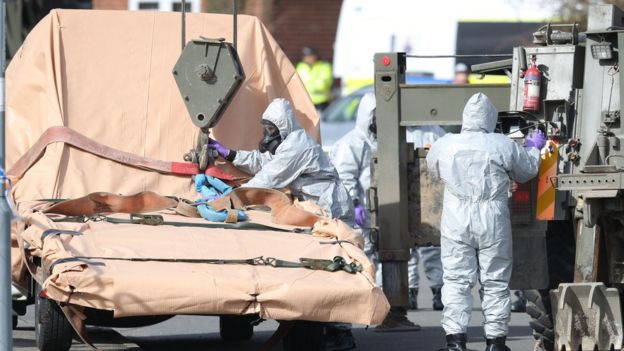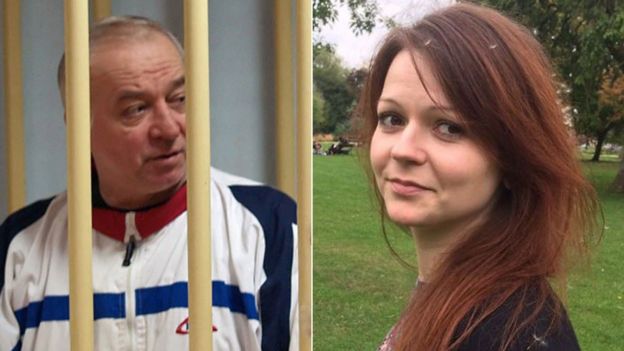
The UK later told the UN Security Council that Russia had used "a weapon so horrific that it is banned in war" in a "peaceful" British city.
Russia denies attempted murder and says it will respond appropriately.
Mrs May also revoked an invitation to Russia's foreign minister, and said the Royal Family would not attend the Fifa World Cup in Russia later this year.
Addressing the UN Security Council, Britain's deputy UN ambassador, Jonathan Allen, accused Russia of breaking its obligations under the Convention on the Prohibition of Chemical Weapons.
- What we know so far
- What are Novichok nerve agents?
- Corbyn aide queries proof of Russian guilt
- How is the UK retaliating against Russia?
"We will stand by the values which are shared by the overwhelming majority of those in this council in this United Nations and we ask you today, to stand by us," he added.
In response the Russian ambassador to the UN, Vasily Nebenzya, denied Moscow's involvement in the attack and demanded "material proof" from Britain to support its charge.
He said: "We were given an ultimatum and requested in 24 hours to admit that we committed a crime. In other words, confess.
"We do not speak the language of ultimatums. We do not use that language with anyone. And we will not allow to be spoken to in that language either."
Mr Allen said the UK government has asked the Organisation for the Prohibition of Chemical Weapons, an independent watchdog, to verify its identification of the substance used in Salisbury.
The US ambassador Nikki Haley said Washington stood in "absolute solidarity" with Britain, citing the "special relationship" between the two countries and saying the US would "always be there" for the UK.
The mass expulsion is the largest since 31 were ordered out in 1985 after double agent Oleg Gordievsky defected.
Former spy Sergei Skripal, 66, and his daughter, Yulia Skripal, 33, remain critically ill in hospital after being found slumped on a bench on 4 March.
- The spy at centre of poison mystery
- Russia retaliation could hurt UK business
- Kuenssberg: No easy choices for UK
Moscow refused to meet Mrs May's midnight deadline to co-operate in the case, prompting Mrs May to announce a series of measures intended to send a "clear message" to Russia.
These include:
- Expelling 23 diplomats
- Increasing checks on private flights, customs and freight
- Freezing Russian state assets where there is evidence they may be used to threaten the life or property of UK nationals or residents
- Ministers and the Royal Family boycotting the Fifa World Cup in Russia later this year
- Suspending all planned high-level bilateral contacts between the UK and Russia
- Plans to consider new laws to increase defences against "hostile state activity"
The use of a Russian-made nerve agent on UK soil amounted to the "unlawful use of force", she said.

The PM, who was earlier briefed by senior intelligence chiefs in Downing Street, added there was "no alternative conclusion other than that the Russian state was culpable" for the attack.
She said it was "tragic" that Russian President Vladimir Putin had "chosen to act in this way".
In other moves:
- Jeremy Corbyn's spokesman has said there is not yet definitive proof the Russian state was behind the attempted murder of a former spy in Salisbury.
- The Foreign Office updated its advice on travel to Russia, saying Britons should "be aware of the possibility of anti-British sentiment"
- The FA said it would work closely with the UK government and authorities regarding its participation in the World Cup in JuneMeanwhile, the police and army have sealed off areas of the north
Dorset town of Gillingham as part of the attempted murder investigation.
A wide cordon is in place around a truck, thought to have recovered Mr Skripal's car from Salisbury, about 20 miles from Gillingham.
About 180 troops have been deployed to Salisbury to help remove vehicles and objects from affected areas.
Zizzi restaurant and Bishop's Mill pub, where the Skripals visited before falling ill, remain closed.
Police from 15 forces across England and Wales have been sent to Wiltshire to support the investigation.
Russia's foreign ministry said Mrs May's statement was "an unprecedentedly crude provocation".
It said it was "categorically unacceptable and unworthy" that the UK government had "seriously aggravated" relations by announcing a "whole set of hostile measures".
Earlier, Russian foreign minister Sergei Lavrov said Moscow would co-operate if it received a formal request for clarification from the UK under the Chemical Weapons Convention, which sets a 10-day time limit for a response.
Mrs May has welcomed support from allies including the US, Nato and the EU.
"This was not just an act of attempted murder in Salisbury - nor just an act against UK," she said.
"It is an affront to the prohibition on the use of chemical weapons."
Mr Skripal, a British citizen, came to the UK in 2010 as part of a "spy swap" after he had been convicted by Russia of passing information to MI6.














No comments:
Post a Comment